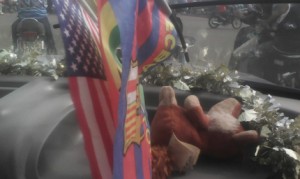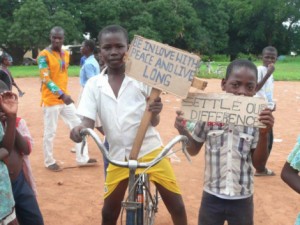American Privilege in Ghana
By AdministratorI’ve never really liked the United States. Growing up in a Native household gave me a weird relationship with the United States, as I think it does for many Natives. I grew up hearing about my mother being told we were all “dirty, drunken, Indians”, fighting assumptions we all live in teepees, and the effects of blood quantum laws on our family. I, too, fought the distinct feeling of otherness I experienced in my small town, being told I had “ugly Indian hair”, that I could own a casino, and having my achievements questioned. I grew up frustrated by continual microaggressions, the ongoing occupation of Native land, and the constantly sanitized version of history I was spoon-fed in school, all leading to a distinct dislike and mistrust of the United States. My mum, on the other hand, is one of the most patriotic people I know. Despite being raised on our reservation, she vehemently defends the United States, not necessarily its government or policies, but the country, which she rightfully claims is “our country.” She grew up fighting racism, defending herself and our people in school, at work, and in her daily life, often responding with humor and education. Even now she becomes irritated at anti-Native racism, extremely proud to be both American and Native American. Both of our sentiments are very common in the Native population. More Native people have served in the military than any other ethnic group. Native people are also extremely vocal about historical and continued mistreatment, occupying Alcatraz for over a year and a half, ongoing protests against the Keystone pipeline, outcry against over a thousand missing Native women in Canada, and countless other protests. To be Native in the United States, or in the Americas, in general, is complicated.
Given that complexity, my general dislike for the United States, and a lifelong desire to travel, I escaped as soon as I could. In the past two years, I have been in the United States for about a month. The funny thing about trying to escape the United States, though, is you can’t. There are plenty of people in the United States who haven’t heard of Macau, or who don’t know the difference between Taiwan and Thailand, or who would have difficulty finding Ghana on a map, but everyone knows where the United States is. I also learned that much to my dismay, “American” was now one of my biggest identifiers. Even as I tried to separate myself from the label, explaining its fraught relationship in North and South America, and trying to emphasize other aspects of my identity, the label stuck. Despite my discomfort and attempted distancing from the United States, I am now, outside the United States, more than I had ever been in it, American. In Macau, this often lead to comedic interactions with my students and friends. My students refused to believe that Americans didn’t eat fast food every day, my friend was shocked that we used headphones in public places, and a Thai taxi driver told me I was “too small to be American”.

I was riding in a shared taxi when I noticed an American flag on the dashboard along with the Ghana flag and the driver’s favorite football team, FB Barcelona.
American privilege is a weird form of privilege I wasn’t really aware of until I began traveling. Regardless of my struggles within the United States, on a global scale, I have privilege as an American. I can go to nearly any country without a visa or with a visa on arrival since the American passport is tied for the first most powerful in the world. When there I can be confident most signs and many restaurants will have an English menu or someone who speaks English, allowing me to avoid learning local languages if I want to. American values of individualism, independence, and direct communication give me the power to express myself (even when it is culturally inappropriate to do so). They also ensure I am heard over local people.
Coming to Ghana made my “American-ness” even more obvious. Unlike in Macau and most other countries I’ve travelled to, I am obviously foreign, and generally assumed to be American. The most common reaction here when people confirm I’m American is asking for a visa. In the North many of our friends ask us to bring them with us and in Accra, there are fairly common signs advertising the lottery that enables Ghanaians to apply for a U.S. visa. Not only would voicing my criticisms of the United States be useless in these situations, but it would be inappropriate. The ability to criticize the States while being able to easily return there is a privilege.

These children were part of a locally lead demonstration on the International Day of Peace in October 2015. They know exactly what their communities need and are taking the steps to make it happen. We were fortunate enough to simply observe this demonstration and learn what peace means for the people of Bimbila in the face of the chieftaincy dispute.
That’s where American privilege becomes a problem. We are given a lot of power and assurance that our opinion matters, especially on a global level. Without critical thought and self-evaluation, that power can be detrimental to true social change. Because of my marginalization within the United States, I maintained a sort of “not all Americans” mentality that separated me from the majority of Americans, allowing me to distance myself from any real self-improvement. It prevented me from seeing how my direct communication style simply talked over my Macau co-workers at times, misinterpreting their silence for agreement. It encouraged me to criticize the United States to people who were struggling to get visas to even visit a country to which I can always return. It meant I felt justified in my frustration when things didn’t happen on an American timeframe.
To do good international work, I realized I needed to change my approach. I couldn’t separate myself from being American, no matter how much I wanted to. I will never not be American. I won’t be able to change the global power of the United States, nor will I likely ever value independence or individualism less. However, I can actively learn to appreciate more subtle forms of communication. I can try to adapt to community-based thinking, learning to when my opinion isn’t needed. I can approach international social change as an ally, realizing that I am not, nor should I be, the center of the discussion. I’m merely a potential form of support, able to fit in where asked, listening more than speaking, learning more than teaching.
